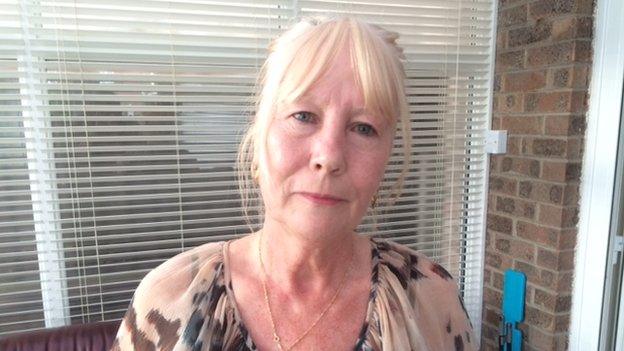Asda faces mass legal action over equal pay for women
- Published
- comments

Asda, the UK's second largest retailer, is facing a mass legal action by women who work in their stores.
The women claim they are not paid the same as male workers in the distribution warehouses - despite their jobs being of "equivalent value".
The case will test how retailers decide what they pay their staff in different parts of their business.
And if the women are successful it could have serious ramifications for the whole sector.
The legal action, believed to be the largest of its kind in the private sector, could lead to some very high payouts.
The legal firm managing the case, Leigh Day, says it has already received 19,000 enquiries from current or former Asda staff in relation to the group legal action.
Big difference
More than 1,000 employment tribunal claims have already been lodged.
The majority of those affected are women but interestingly, there are also some male employees working in the stores who are taking part in the process. They would also see a pay rise if the action taken on behalf of women under equal pay legislation is successful.
Asda has signalled it will fight the claims vigorously and says it does not discriminate.
Lauren Loughheed, the solicitor with Leigh Day who is leading the case, said that the pay difference between shop and warehouse workers could be as much as £4 an hour.
That's a big difference when you are earning £7 an hour. And, if the cases are successful, women workers could be compensated for six years of back pay.

One Asda store worker I spoke to said that the work was the same whether you were in the shop or in the warehouse - packing and unpacking pallets of clothes and food and putting stock on shelves, often through the night.
She said she should be paid the same as the men working in the warehouse.
'We do not discriminate'
Asda says it has strong policies on treating all its staff equally. Sources argued that the work in the distribution warehouses was harder physically as well as often being outside.

Irene Cole retired from Asda two years ago, but could still be entitled to compensation.
An Asda spokesperson said: "A firm of no win, no fee lawyers are hoping to challenge our award-winning reputation as an equal opportunities employer. We do not discriminate and are very proud of our record in this area which, if it comes to it, we will robustly defend."
The cases, which are likely to be heard next year, go to the heart of the problem of equal pay.
In the public sector, the issue has led to major battles between councils and their workers. Women who worked as cleaners and school catering staff have taken hundreds of class actions to close pay differentials with men who had jobs such as refuse collector or street cleaner.
One council, Birmingham, has agreed to pay over £1bn to settle the claims of tens of thousands of women which go back over many years.
Ms Lougheed said that the private sector had been slower to act and that this test case could prove a watershed.
Unskilled labour
In fact, it could be the "Made in Dagenham" case for the 21st century.
If you remember, Made in Dagenham was the film about the 1968 legal battle waged at Ford's east London car plant.

Women workers at Ford's Dagenham plant fought for equal pay and found a sympathetic ear in Barbara Castle
Women who undertook the tough work of stitching the car covers for the Cortinas and Zephyrs that rolled off the production line wondered why they were considered "unskilled labour" while men in the factory were considered to have more skilled jobs and were therefore paid more.
The women, led by Eileen Pullen, Vera Sime, Gwen Davis and Sheila Douglass, took action and sparked the process that led to the Equal Pay Act of 1970.
There are some rather nice interviews with the cast of the film that you can watch here.
Equal value
Despite the women's victory, the gender pay gap is still a problem. Latest figures from the Office of National Statistics revealed that in 2013 there was a 19.7% gap between the earnings of men and women, as measured by hourly earnings for all employees.
Gloria de Piero, the shadow women's minister, wants to see action. She said that all companies above 250 employees should be obliged to undertake an equal pay audit that would be published in the company's annual report.
But many businesses are concerned by new regulations which would mean extra costs.
It is also often difficult to compare what people earn if they undertake work which is very different. And comparing hourly rates is very different from comparing the pay of salaried staff.
Under equality law, pay should be the same for employment of equal value.
That can often be a matter of judgement. And, as in this case, that is where the battle lies.